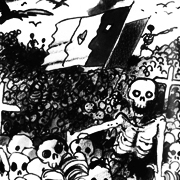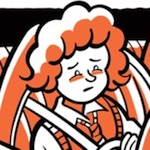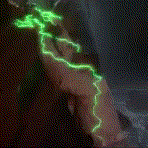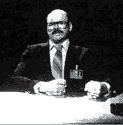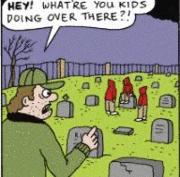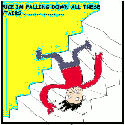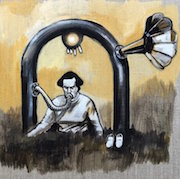|
Nabokov reading it going "not his poo poo again"
|
|
|
|

|
| # ? May 18, 2024 14:47 |
|
Is this the right place to talk about/ask about dramas, plays, etc.? I won't be just reading these if possible, I'll look up performances of them. Because my brain is broken, thinking a ton about a video game has led me in a very roundabout way to wanting to experience Tragedies. Specifically I guess Elizabethan Tragedies - Shakespeare, Marlowe, etc. Not so interested in Greek tragedies if I'm being honest. Maybe some modern ones too - Arthur Miller is the name that comes up all the time for that. Moby Dick is also recommended as a sort of modern tragedy, though. Might get that for an example of actual Literature. Recommendations are welcome. I guess I'd say what attracts me is the entire concept of a tragic hero; someone with a personality that is such that it makes them both noble and vicious, that leads them to greatness yet also carries them on to failure. (I always thought about this when reading about Alexander and Napoleon since I've always heard they could have sat nice and pretty on all their conquests but neither of them knew when to stop. But if they had known how to just stop, would they have been Alexander or Napoleon in the first place?) Oh yeah, I didn't really care for Hamlet. I did read that a long time ago.
|
|
|
|
absolutely the right place 
|
|
|
|
NikkolasKing posted:Because my brain is broken, thinking a ton about a video game has led me in a very roundabout way to wanting to experience Tragedies. Specifically I guess Elizabethan Tragedies - Shakespeare, Marlowe, etc. Not so interested in Greek tragedies if I'm being honest. You might also want to check out 17th-century French tragedians like Racine and Corneille, Spanish baroque playwrights like Calderón de la Barca and the plays of Goethe and Schiller. They were all either influential on or influenced by Elizabethan and Jacobean theatre and they all hinge on the same exploration of the passions as motivators for the noble and ignoble acts of their protagonists.
|
|
|
|
NikkolasKing posted:Is this the right place to talk about/ask about dramas, plays, etc.? I won't be just reading these if possible, I'll look up performances of them. Go Jacobean. Ford's 'Tis Pity She's A Whore and Middleton's Revenger's Tragedy.
|
|
|
|
lost in postation posted:You might also want to check out 17th-century French tragedians like Racine and Corneille, Spanish baroque playwrights like Calderón de la Barca and the plays of Goethe and Schiller. They were all either influential on or influenced by Elizabethan and Jacobean theatre and they all hinge on the same exploration of the passions as motivators for the noble and ignoble acts of their protagonists. I actually have some Goethe already, albeit his stories and not his dramas. I got some Schiller too but again its his philosophy and not his plays. I like German philosophy from that period a lot. But anyway, the problem is I don't speak a word of German or French and I've never found any Schiller or Racine performed in English. The reason every high schooler (including me once upon a time) hates Shakespeare is because they were made to simply read him. That's the worst way possible to introduce somebody to a drama. So I feel I'm kind of restricted to English dramas for the time being. Carly Gay Dead Son posted:Go Jacobean. Ford's 'Tis Pity She's A Whore and Middleton's Revenger's Tragedy. I had actually heard of Tis Pity She's A Whore already and was curious about it. I think I read somewhere the Jacob tragedies were a lot more violent. But it's on my extensive list. I luckily found collections of both Marlowe and Shakespeare performances so gonna dive into that as soon as I can buy them. Same for Moby Dick.
|
|
|
|
Can also check out this thread. https://forums.somethingawful.com/showthread.php?threadid=3130479 It’s from an English professor who, by the end of the thread, has published a book on Shakespeare and is answering questions about tragic heroes.
|
|
|
|
lifg posted:Can also check out this thread. https://forums.somethingawful.com/showthread.php?threadid=3130479 He's been posting in that thread lol
|
|
|
|
I would venture to say that, because of the exhaustion of following four hours of histrionics in language full of unfamiliar vocabulary and layered meaning, it is almost always more enjoyable to read a Shakespeare play before watching it.
|
|
|
|
What’s the best Goethe’s Faust translation? I’ve been meaning to read that for a minute.
|
|
|
|
Heath posted:He's been posting in that thread lol Yeah, I still remember my first post in there from many years ago now. I remain convinced that Antony and Cleopatra should be taught more and would certainly grab young imaginations better than Romeo and Juliet. Ancient Rome and Ancient Egypt are about as well known as any distant historical location is for the average teenager, and the fall of the Roman Republic/birth of the Empire is a topic that captivates everyone's imagination. Add a fiery romance to it and you got yourself a winner.
|
|
|
|
David Luke
|
|
|
|
Gaius Marius posted:David Luke Looks like my library has Walter Arndt or Barker Fairley. Might go with Arndt as the Norton Critical also has notes.
|
|
|
|
Heath posted:Started reading The Three Musketeers. It's very funny so far and the book directly compares d'Artagnan to Don Quixote, and appropriately enough he rides into town on the shittiest horse and gets beaten with sticks within the first few pages so that tracks Really enjoyed Three Musketeers, I recently bought the sequel Twenty Years After used. Even though I've never seen the two sequel books discussed I wanted to check out more of the story. Count of Monte Cristo was probably one of the first 'larger' books I read and completed when I was a kid, Dumas just one of those legends.
|
|
|
|
For the last couple years, ever since I really started getting more seriously (in my own amateurish way) into philosophy, I've gotten into the habit of looking up secondary and supplementary material on everything I get into. Whatever TV show, video game, or book I start on, I try to find some academic discussion and elucidation of it. Holy poo poo there is so much more stuff on tragedies than anything else I've ever pursued outside of like, Plato. Luckily I've got a foothold now, I understand a lot of the big names and what particular school of criticism they come from, etc.. It's great stuff but very disorienting at first. If anybody else might care about the different ways people try to understand/interpret tragedies, this book has been very, very helpful https://archive.org/details/shakespearestrag0000cunn_c2e8 Gives a bit of a heads up after I actually get through the plays and want to read more. I'll understand where people are coming from. Also just a quote from Goethe on tragedies in another book I'm going through on the theory: GOETHE Even a noble Greek who well knew how to portray heroic characters did not disdain to let his heroes weep when they suffered such agony. He said: Noble are the men who can weep. Leave me alone - you who have a dry heart and dry eyes!
|
|
|
|
Heath posted:Started reading The Three Musketeers. It's very funny so far and the book directly compares d'Artagnan to Don Quixote, and appropriately enough he rides into town on the shittiest horse and gets beaten with sticks within the first few pages so that tracks I read the sequel first and was pleasantly surprised by the fact that the first book gets right into the happenings. (The sequel is extremely boring for the first 40 000 pages or so.) Not that I'd call it Real Literature but 
|
|
|
|
I got invited to a book club where they spend each week going over a couple pages of Finnegans Wake at a time. It is populated exclusively by literature professors. I am just some rear end in a top hat who reads a lot. I have never read Finnegans Wake (or any Joyce for that matter). Is there anything I should do to prepare or dive in and hope for the best? Is there any background material that might help contextualize the book?
|
|
|
|
Started Goethe’s Faust. Occasionally Arndt’s translation reads clunky, but I haven’t run into anything egregious. The play opens with a director, poet and merry person (comedian?) arguing about what audiences want, which is funny and reads as relevant as ever. Next scene is a Job parallel in which Satan bets God he can make Faust fall. In the next, Faust monologues his own version of Ecclesiastes before the Easter bells stop him from suicide, though I didn’t pick up on his contemplating. An Easter song closes out the scene and seems to spin Christ’s resurrection as abandoning Earth (and Faust) to suffer alone, though the Angel’s part contradicts that a bit. Maybe we’re looking at human and divine perspectives. It’s cool and a nice way to ease myself back into reading verse. Far easier than Shakespeare, but still requires a fair amount of attention.
|
|
|
|
sephiRoth IRA posted:I got invited to a book club where they spend each week going over a couple pages of Finnegans Wake at a time. It is populated exclusively by literature professors. I am just some rear end in a top hat who reads a lot. I have never read Finnegans Wake (or any Joyce for that matter). Reading everything else Joyce wrote, would prepare you better than anything else. Beyond that, Joyce himself pointed to Vico’s La Scienza Nuova as informing the structure of FW, as much as the Odyssey does for Ulysses. Joseph Campbell’s Skeleton Key is the most famous “guide” but it is best taken with a grain of salt. If you can find it, the “Third Census of Finnegans Wake” by Adaline Glasheen is the most no-nonsense reading companion, simply to keep track of the principal characters through their innumerable permutations.
|
|
|
|
our exagmination round his factification is a neat collection of contemporary essays on finnegans wake, written while the book itself was still being written and featuring amongst others, beckett. it'll help set certain parts of the stage, but not really give you anything beyond that, after that it's just you and joyce. you can find it for free online
|
|
|
|
sephiRoth IRA posted:I got invited to a book club where they spend each week going over a couple pages of Finnegans Wake at a time. It is populated exclusively by literature professors. I am just some rear end in a top hat who reads a lot. I have never read Finnegans Wake (or any Joyce for that matter). The best advice I can give is probably initially think of it like music: when hearing a song, you shouldn't necessarily need to understand every single lyric in the process to allow yourself to enjoy it, especially when it's unfamiliar. Getting stuck because you want to 'understand' every single page right out the gate can get in the way of appreciating what you do get from it. Asking someone to read all the rest of Joyce just to prepare for the one book is a tall ask but a somewhat reasonable one in this case. Dubliners at minimum is both a good survey of what Joyce is like and well worth reading unto itself.
|
|
|
|
I've had much more success in recent years just opening it randomly and finding something amazing. I can't keep track of "plot" but you kind of see the characters emerge when you take a high-altitude, scanning sort of perspective on the text.
|
|
|
|
|
mdemone posted:I've had much more success in recent years just opening it randomly and finding something amazing. I can't keep track of "plot" but you kind of see the characters emerge when you take a high-altitude, scanning sort of perspective on the text. This is a perfectly legitimate way to read that book basically by design. The circular structure where the book begins with the second half of a sentence and ends with the first half of the same sentence means even if you're starting from the physical beginning of the volume you're also in a sense opening it at 'random' spot and going from there It's not rare to hear suggestions to start at the "Anna Livia Plurabelle" section (Book 1 chapter 8)
|
|
|
|
ThePopeOfFun posted:Started Goethe’s Faust. Occasionally Arndt’s translation reads clunky, but I haven’t run into anything egregious. Sad to hear ardnts translation is stilted. Luke's is the only one I've read all the way through but it's exceptionally easy to read. One of the things I love about the novel is how unorthodox Goethe is in his approach to faith and to the tale of Faust himself. It's a really off kilter work, but one that manages to live up to Goethe's immense ambitions for the work and pretty drat funny. Part one is this Shakespearean tragic comedy with a nerd trying to get laid. And then Part II is this insane rumination on metaphysics, classical history, contemporary art, and philosophy. Where centuries pass and kingdoms fall in a single stage direction. But at it's heart is still about one dude trying to quell his insatiable ambitions. Its a shame that so many in the anglosphere shrug off Pt.II when it's really the far more interesting work. Although the few laymenish people I've seen talking about it didn't really understand much of what it was saying at all.
|
|
|
|
Gaius Marius posted:Sad to hear ardnts translation is stilted. I wouldn't say it's all stilted by any means, but occasionally something ham-fisted happens. The first three lines in this example are great, but the last two stack two cliches on a clumsy rear end simile. Mephistopheles: My thanks to you; I've never hidden An old distaste for dealing with the dead. Give me a full-cheeked, fresh-faced lad! A corpse with me is just no dice. In this way I am like a cat with mice. There's an "oh fooey!" Elmer Fudd quality to "just no dice" that I had to laugh at. Regardless, the occasional clunk doesn't bother me. I'm excited to get more into it because you make Part II sound really good.
|
|
|
|
Finished The Passenger. I won't praise or criticize it per se because I'm not really willing to publicly take the temperature yet on the first new Cormac McCarthy novel before I've had a chance to go back through it at least, but: I already mentioned that it most reminded me, on first glance, of Suttree. I'm most of the way through a reread of Suttree these past few days, and having restarted The Passenger today as well, I'm starting to see the possibility that The Passenger is Suttree's dark obverse. It feels like a stripped-down, somewhat arch, perhaps even deliberately self-parodic take on Suttree's mythological richness and the title character's tragic grandeur.
|
|
|
|
Further into Goethe’s Faust. Another reminder that lonely, isolated, bored and horny men abound throughout time, getting into trouble and following people who wish to use them. Being too Online, it is impossible to not read Faust as some as incel-adjacent. He listens to the devil because he sees no hope of escaping his current situation. Even so, it’s fun to watch him romp around with Mephistopheles as the devil dazzles a pub with magic tricks. I don’t know much about the time, but I’m surprised at how much magic there is. And there seems to be a difference between legitimate magic Faust tries his hand vs. the magic of the witch and the devil. It’s not mind blowing stuff, but I’m having a good time.
|
|
|
|
A lot of the sturm und drang's attitude to drama comes from a very incellish attitude, they hated the prudish approach to shakespeare and the greek dramas of 18th century forebears, but many ascribed it to a general kind of effeminacy in rationalist society. There's always that kind of reactionary element to romanticism (I know goethe went back to faust part 1 after moving to weimar and moved it away from the sturm und drang era original though) sephiRoth IRA posted:I got invited to a book club where they spend each week going over a couple pages of Finnegans Wake at a time. It is populated exclusively by literature professors. I am just some rear end in a top hat who reads a lot. I have never read Finnegans Wake (or any Joyce for that matter). Use fweet.org liberally is my advice
|
|
|
|
got For Whom The Bell Tolls out of the library and am reading quickly cause i gotta return it...it's good! the imagery of the spanish mountains is very beautiful
|
|
|
|
Reading "El otoño del Patriarca" by Marquez and hating the first chapter. Multi-page sentences gently caress with me because I read on the bus and during lunch, but there's no good place to place a bookmark. Also not being clear at all times about who's doing or speaking is wack. (I wonder if part of that is due to the translation.)
|
|
|
|
3D Megadoodoo posted:Reading "El otoño del Patriarca" by Marquez and hating the first chapter. Multi-page sentences gently caress with me because I read on the bus and during lunch, but there's no good place to place a bookmark. If it's anything like HYoS that's just Marquez
|
|
|
|
Heath posted:If it's anything like HYoS that's just Marquez I've read 3D Megadoodoo fucked around with this message at 19:30 on Sep 7, 2022 |
|
|
|
ThePopeOfFun posted:Further into Goethe’s Faust. Another reminder that lonely, isolated, bored and horny men abound throughout time, getting into trouble and following people who wish to use them. Being too Online, it is impossible to not read Faust as some as incel-adjacent. He listens to the devil because he sees no hope of escaping his current situation. Even so, it’s fun to watch him romp around with Mephistopheles as the devil dazzles a pub with magic tricks. One important thing to note is that Faust's predicament is entirely self caused, he's been seeking knowledge in order to escape his own fate for so long that he's ended up with his entire life gone to the endless study and toil and left nothing for the "real" experience. When he at first succeeds at summoning the Earth Spirit it says to him that he's strived for so long to summon it and yet when he does so he hides from it. And more than that the Earth Spirit tells him that it and Faust are the same in character but still Faust is afraid. The work is very heavily focused on the difference between the received or studied knowledge and the experienced knowledge. Faust might have studied enough to lay out the Macrocosm in front of himself, but in those dusty and dark years his own life has atrophied. He cannot comprehend the Earth Spirit, how could he he's spent his time on earth locked away from the splendor of the earth. Reading the opening again after the end of PT.II is highly recommended to see how different Faust is in perspective despite theoretically holding the same goal. Also while you can see the Incel adajcentness of Faust, and I myself have made jokes to the effect of that, I've seen some people double and triple down on that trait to the effect that they lose the whole rest of the plot. There was a podcast called the Canon Ball that looked at the western canon, and despite professors of some level they spent most of the PT.II discussion arguing about nonsense because they fell right into the sex groove and couldn't escape. It did a disservice to the work and showed their critical thinking and analytical abilities to be very subpar. Digression aside, the work deals with the sensuous, experiential, and emotional values of love and loss, but also with the aesthetics of beauty but most importantly with the value of change. The change of elements, the earth, time, empire, art, culture, and the human soul. It's also hilarious, Mephisto is an absolute lad
|
|
|
|
The accusation of Incel being applied to people living hundreds of years ago seems extremely silly. NikkolasKing fucked around with this message at 03:30 on Sep 9, 2022 |
|
|
|
Need everybody to appreciate this absurd haul I scored from a Half-Price Books in STL, $2 each. They had a series of carts out advertising an "ANTI-INFLATION SALE" and I would've been shocked to find two of these on any rack that cheap. I didn't even buy all the worthwhile stuff (there was an omnibus of Wodehouse's Jeeves novels, Achebe's Things Fall Apart, Mamet's Oleanna, the Oedipus Cycle translated by Fitzgerald, etc.)
|
|
|
|
NikkolasKing posted:The accusation of Incel being applied to people living hundreds of years ago seems extremely silly. If we’re doing history, sure. But this is fiction! And though no one has accused Faust as such, and I was very clear about what I’m bringing to the text, what’s wrong with reading the text with contemporary eyes? I think the cool thing about fiction is it requires no prior knowledge other than an ability to read. I also cheekily assert that the Faust I’m following around never lived at all.
|
|
|
|
Gaius Marius posted:There was a podcast called the Canon Ball that looked at the western canon, and despite professors of some level they spent most of the PT.II discussion arguing about nonsense because they fell right into the sex groove and couldn't escape. It did a disservice to the work and showed their critical thinking and analytical abilities to be very subpar. Are there any good podcasts about literature?
|
|
|
|
Solitair posted:Are there any good podcasts about literature? There's a few depending on your definition. Elder Sign and The Gene Wolfe Literary Podcast by Brandon Budda and Glenn McDorman discuss Weird Fiction and Gene Wolfe's oeuvre respectively and they manage to do a great job breaking things down, bringing in history and discussing the text in an interesting and open way that isn't overly reliant on the current consensus of the texts. Honestly that might be it, I got on a big Nabokov kick awhile ago and decided to check out some podcast on Pale Fire while I traveled across the states. Horrible mistake, they spent a good 30 minutes debating if it was Modernist or Post Modernist for zero purpose and then introduced me to the Hazelite interpretation which can just get fully hosed. NikkolasKing posted:The accusation of Incel being applied to people living hundreds of years ago seems extremely silly. I agree both because I don't like post labeling things, and I don't like what the internet has done with the idea of the incel given it's a symptom of our deeply sick culture. But Faust's very first Soliloquy is about how he wasted his whole life reading books like a nerd instead of "touching grass" so it is in a sense apropos.
|
|
|
|
ThePopeOfFun posted:If we’re doing history, sure. But this is fiction! And though no one has accused Faust as such, and I was very clear about what I’m bringing to the text, what’s wrong with reading the text with contemporary eyes? I think the cool thing about fiction is it requires no prior knowledge other than an ability to read. Well I would agree with that. It was like in a discord the other day somebody posted a meme of "Lord of the Flies is about human nature vs. Lord of the Flies is about spoiled British kids." Macbeth is about human ambition vs. Macbeth is Shakespeare's whining about James I. If we limit a story to purely the interests of the writer instead of trying to update or universalize it, it's pretty much dead and worthless, IMO. A great piece of art should, as you say, be able to speak to anyone of any time or place. I guess incel is just kind of a tired term I see thrown around a bit too much. NikkolasKing fucked around with this message at 05:57 on Sep 9, 2022 |
|
|
|

|
| # ? May 18, 2024 14:47 |
|
Solitair posted:Are there any good podcasts about literature? There are no good podcasts. (I don't know what a podcast is, exactly.)
|
|
|









